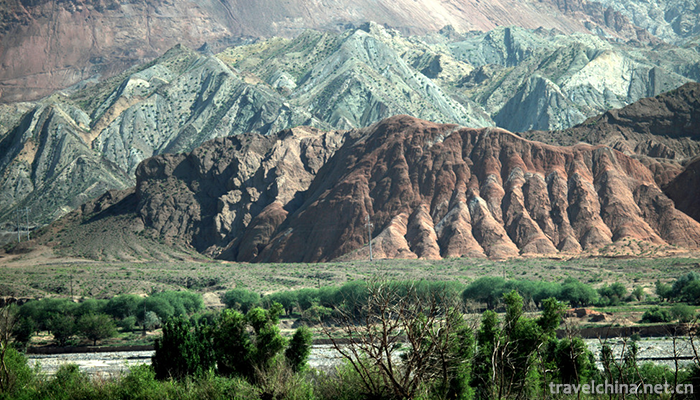Tianshan Grand Canyon Scenic Area is located in Urumqi County, 48 kilometers away from the urban area. The total planned area of the scenic spot is 1038.48k, surrounded by mountains on three sides, with an average altitude of 2020 meters and an average annual temperature of 4-6 C. It is the most complete and ornamental primitive snow mountain spruce forest on the northern slope of Tianshan Mountain. It covers all natural landscapes except desert in Xinjiang. It is a living museum of nomadic culture before human farming civilization. It has high tourism appreciation, scientific investigation and historical and cultural value. It is rated as national forest park, national sports and leisure base, national AAAAA scenic spot, national fitness and outward bound sports training base of autonomous region, walking sports base of autonomous region and national fitness and mountaineering training base of autonomous region.
Development history
It was a famous hunting area in the Tang Dynasty.
It was a famous pasture in the Qing Dynasty.
As early as the Qing Dynasty, it has been used for summer tours.
Although not vigorously developed at the beginning of liberation, construction started in 2005, and the scenic spot officially opened in 2008, in 2011, the Tianshan Grand Canyon scenic spot in Urumqi successfully ranked among the national AAAA-level tourist attractions. In December 2013, Tianshan Grand Canyon Scenic Area in Urumqi successfully entered the national AAAAA-level tourist attractions. Zhang Lanqi, chairman of the board of directors, grasped the tourist market while creating the brand image of the scenic spots.
geographical position
Tianshan Grand Canyon Resort is located in the southern suburb of Urumqi, capital of Xinjiang Uygur Autonomous Region, Banfanggou Township of Nanshan, 48 kilometers away from Urumqi City, with an average elevation of 2000 meters, an average annual temperature of 4-6 degrees C. It spans Banfanggou Township, Toli Township and Shuixigou Township of Urumqi County, covering most of Zhaobishan National Forest Park. The total planning area of the scenic spot is 1038.48k. The scenic spot starts from Banfanggou Township Forest Pipe Station in the north, and goes south to the boundary of Toxon County, east to 216 National Highway in Urumqi County and west to 103 Provincial Highway. The longest section of the whole scenic area is about 49 km in the north and south, and the longest section in the East and West is about 42.5 km in width. The scenic area is situated on the north slope of the middle part of Tianshan Mountains, between Bogda Peak and Tianger Peak, between Banfanggou Township Dengcaogou Estuary in the middle part of Tianshan Mountains, and on the southern margin of Junggar Basin.
topographic features
The overall topography of the resort is high in the South and low in the north, inclining from south to North and from southwest to northeast. Its planning scale is 1038 square kilometers, relying on Zhaobi Mountain National Forest Park and Zhaobi Mountain Scenic Area, it is a new scenic spot group of Nanshan Ranch in the famous scenic spot. The scenic area of Tianshan Grand Canyon is located in the upper part of alluvial fan on the northern slope of Tianshan Mountains. The stratum is loose Quaternary deposits. The sand layer is about 1 m, which contains a small amount of gravel. The surface vegetation type is desert grassland (which can be planted crops). The water resources in the area are good. Several mountain and stream rivers in the scenic area flow between the two mountains, forming a rare forest canyon.
Characteristics of scenic spots
According to folklore, Zhaobi Mountain is named for its steep mountains, sunshine and rivers competing for glory. There are also myths and legends: Tang monks and apprentices went to the west to collect sutras, once passed by this place, met with seven serpents and demons, and designated to fight with Sun Wukong. Sun Wukong was too lazy to start. He plucked a fairy hair and turned it into a fairy fruit and threw it at Zhaobi Mountain. The serpent was dripping, and rushed to the fairy fruit from three different directions at the same time, competing with each other, and was fixed here by the mantra of the Great Sacred.
On the southern side of Zhaobi Mountain, the cliffs on both sides of the valley are opposite, only a line of blue sky is exposed, forming a famous water gorge of more than ten kilometers long. Among them, Wudaowa section of the back mountain is covered with deep forests and grass, the cliffs are pressing water, and there are many stone gates and hills turning back. The environment is quiet and dangerous. There are often wapiti, roe deer, wild boar and so on. It is a good place for exploring and eco*tourism.
Value of meaning
It is the most complete and ornamental primitive snow mountain spruce forest on the northern slope of Tianshan Mountains. It covers all the natural landscapes in Xinjiang except desert. It is a living museum of nomadic culture before human farming civilization. It has high tourism appreciation, scientific investigation and historical and cultural value. It has been rated as national forest park, national sports and leisure base, national AAAAA scenic spot and autonomy. Regional national fitness development sports training base, autonomous region hiking base, autonomous region national fitness mountaineering training base.
Traffic routes
Self-driving tour route: the whole journey from Ili Prefecture to Grand Canyon is 732.4 km/6 hours and 59 minutes. 2. G30161, Lili Kazakh Autonomous Prefecture, travels 52.4 km along G3016, facing Jinghe/Lianhuo Expressway/G30 direction.
Self-driving route:
Along the river beach expressway, Yannan overpass passes Urapur Driving School, Tianshan Avenue Toll Station, Ganhezi Bridge, and goes straight to the intersection of Shuixigou and Banfanggou, to the direction of Nanshan Banfanggou and to the gate of the scenic spot through Banfanggou Township.
Bus route:
South Suburb Passenger Station-Huanghe Road Middle Bridge: Bus fare 20 yuan to and from the scenic spot











0 Questions
Ask a Question
Your email address will not be published.